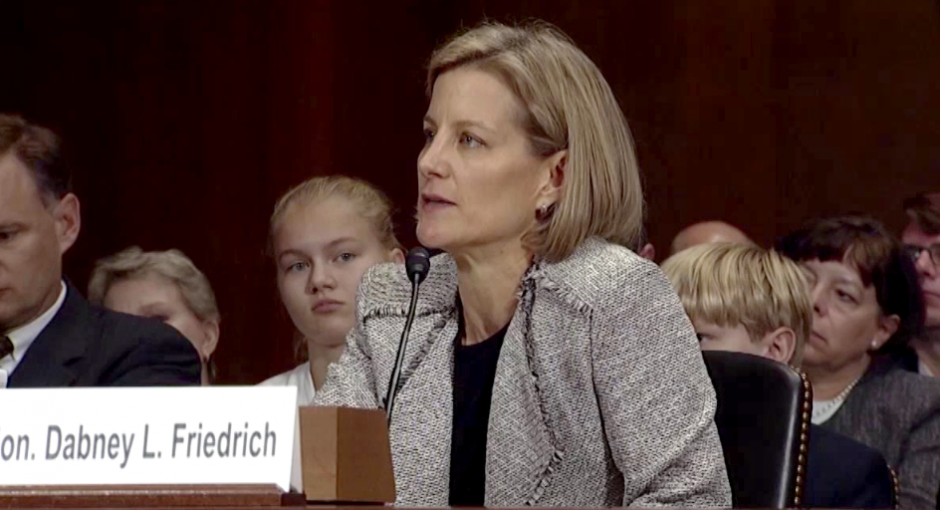The federal government on Wednesday told the judge that ruled against it in drug makers Novartis and United Therapeutics’ (UT) 340B contract pharmacy lawsuits it needs more “time to decide whether to file appeals.”
The government’s Dec. 1 statement about needing more time came on the same day that hospital group 340B Health called on the government either to appeal U.S. District Judge Dabney Friedrich’s Nov. 5 joint ruling in Novartis and UT’s cases or “take other necessary actions to respond to that decision.”
“The longer this problem continues without resolution, the more drug companies will become emboldened to start unilaterally violating the law and causing irreparable harm to hospitals and their patients,” the group said. 340B Health urged the government to do something on the day that Amgen became the 10th drug manufacturer to take steps to deny 340B pricing when contract pharmacies dispense drugs. Amgen’s policy, which applies to hospitals only, takes effect Jan. 3.
U.S. Health and Human Services (HHS) Secretary Xavier Becerra reportedly is the target of a letter-writing campaign encouraging the government to file an appeal in the Novartis and UT cases.
Two other federal district judges have handed down decisions in 340B contract pharmacy cases—in Lilly’s lawsuit, and a joint ruling in Sanofi and Novo Nordisk’s lawsuits. All three manufacturers have appealed those decisions. A decision is expected at any time in AstraZeneca’s contract pharmacy lawsuit.
Wednesday’s developments show just how tangled the 340B contract pharmacy fight has become.
In addition to being the judge in Novartis and UT’s cases, Friedrich is the judge in drug industry consultant Kalderos’ 340B contract pharmacy-related lawsuit. The government said in a Dec. 1 motion in Kalderos’ lawsuit that it needed more time to decide whether to appeal Friedrich’s joint decision in Novartis and UT’s cases.
The government had a Dec. 17 deadline to respond to Kalderos’ legal complaint.
Kalderos sued on Oct. 6. Friedrich handed down her decision in the Novartis and UT cases on Nov. 5. She struck down HHS’ May 17 letters telling Novartis and UT their policies were illegal and had to stop. She also, however, declined to declare that the two companies’ policies were legal. Any future federal enforcement action against the companies, she said, would have to rest “on a new statutory provision, a new legislative rule, or a well-developed legal theory that Section 340B precludes the specific conditions at issue here.”
Neither Novartis nor UT had appealed Friedrich’s ruling as of this morning.
The government told Friedrich in its Dec. 1 motion that, on or by next week Wednesday, Dec. 8, it “intends to file a motion to stay the proceedings in this case to permit the government sufficient time to decide whether to file appeals in Novartis and United Therapeutics and, if appeals are filed, to stay the proceedings in this case pending resolution of those appeals.”
The government’s Dec. 1 motion is silent about when it might file those appeals—if it decides to appeal at all.
Kalderos, it said, indicated it would oppose the government’s request for a stay.
The government asked Friedrich to extend its Dec. 17 deadline to respond to Kalderos’ complaint “until three weeks after either (1) any stay is lifted or (2) the court denies the stay motion—whichever is sooner.”
“There is good cause to grant this request,” the government said. “The disposition of any appeal in Novartis or United Therapeutics will likely be relevant to the court’s resolution of [Kalderos’] claims in this case. Moreover, [Kalderos] asks the court to weigh in on the validity of drug manufacturers’ 340B policies that are currently subject to litigation pending in various courts of appeals and another district court, and seeks injunctive and declaratory relief that could impact that litigation if granted.”
In an unpublished order on Dec. 1, Friedrich gave the government until Jan. 31 to respond to Kalderos’ complaint.
If all of that was not complicated enough, it is worth mentioning that Friedrich is assigned to a fourth 340B contract pharmacy case—Boehringer Ingelheim’s Oct. 25 lawsuit challenging HRSA’s Oct. 4 finding that BI’s denials of 340B pricing when covered entities use contract pharmacies are illegal and must stop.


